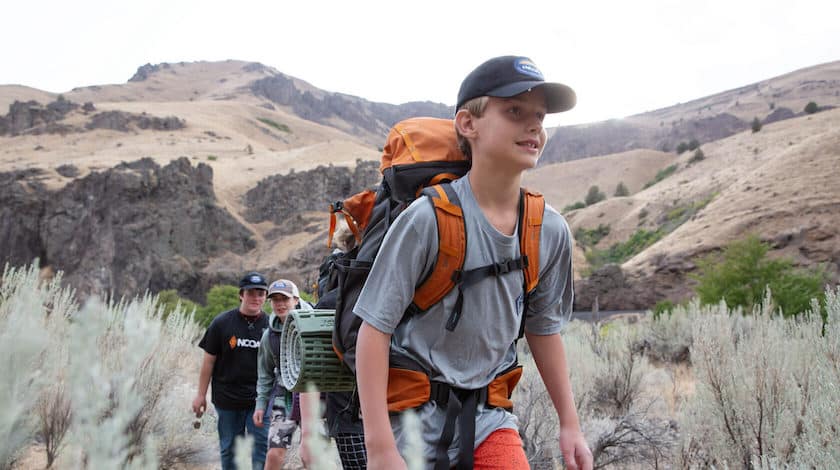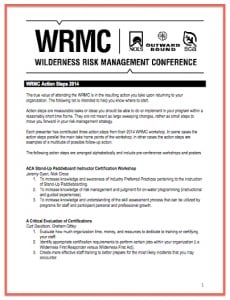What’s the Difference Between NOLS, Outward Bound, and Other Outdoor Programs?
NOLS and Outward BoundAs an accredited outdoor and adventure education provider, we here at The National Center for Outdoor & Adventure Education (NCOAE) know that people are diligently doing their homework in their search to find the best guided wilderness trips for their children or for themselves.
And topping their list of questions is this query: What makes NCOAE different from programs like Outward Bound, programs like NOLS, and even traditional summer camps? How do you make a well-informed choice between our outdoor education company’s offerings and those offered by a summer camp, tour operator, GAP semester provider, or an unaccredited outdoor adventure programming company?

Many organizations like ours seek to set themselves apart from the top two standard bearers, namely, The National Outdoor Leadership School (NOLS) and Outward Bound (OB). Truth be told, NCOAE’s similarities to those organizations far surpass our differences. In fact, like so many other organizations, we trace our pedigree back to programs like Outward Bound and NOLS.
NOLS and OB are leaders in the field, and for very good reason. They’ve been around longer than most every other outdoor education and adventure programming organization out there. Both brands are highly recognizable and trusted, and each has trained hundreds of thousands of people — many of whom have gone on to found outdoor recreation companies of their own.
In addition, these two organizations play leading roles within the outdoor education industry, from convening the annual (more…)
Takeaways From The 2014 Wilderness Risk Management Conference
Conferences A rock fatally struck a National Outdoor Leadership School (NOLS) student on the head 25 years ago, and the subsequent rescue efforts — in darkness and stormy weather — later resulted in an active collaboration between NOLS, Outward Bound and other outdoor education organizations to take a closer look at their risk management and safety practices.
A rock fatally struck a National Outdoor Leadership School (NOLS) student on the head 25 years ago, and the subsequent rescue efforts — in darkness and stormy weather — later resulted in an active collaboration between NOLS, Outward Bound and other outdoor education organizations to take a closer look at their risk management and safety practices.
The student, 24-year-old David Black, was fatally injured when another climber dislodged a rock above him, hitting Black in the head. Black was one of three students and a NOLS leader who were descending Mt. Warren in Wyoming’s Wind River Range on a midsummer afternoon in 1989.
In a review following the incident, leaders from both NOLS and Outward Bound agreed that there were contradictory practices in place between the two organizations — guidelines that were supposed to provide protocol before, during and after such incidents occur in wilderness. Buoyed by Black’s family — which challenged NOLS to do something about the lack of communication between industry players on the topic of risk management — NOLS organized the Wilderness Risk Managers Committee. In addition to NOLS, the group consisted of leaders from Outward Bound, the Wilderness Medicine Society, Exum Mountain Guides, the Association for Experiential Education, the National Park Service, National Safety Network, American Alpine Club and The Outdoor Network.
A year later, the committee had outlined a list of concerns that could have an adverse impact on each organization. Among those topics were suggestions to tone down the risk of some outdoor adventures in order to ensure safety. The concerns also targeted a need for consistency when it came to gathering data following an incident in the wild, and the problems associated with reliance on tech gadgets that can remove self-sufficiency from the experiential education equation.
The committee also agreed that it was to remain a collaborative communications group rather than a rule-making body, and it set about a plan to host a larger gathering of outdoor professionals the following fall. What followed in September of 1994 was a gathering of nearly 200 outdoor education leaders, guides and other stakeholders in Washington State for the first-ever Wilderness Risk Management Conference (WRMC).
Much has been accomplished over the past two decades, with the fledgling forum developing into an international conference for outdoor education organizations of all scopes and sizes. These groups share the wilderness with others for the purpose of education, adventure, personal growth, leadership development and service learning. But specifically, the conference is a place for discussions about the risks that come with the rewards of a guided outdoor adventure.
And in each of the past 21 years, the WRMC has concentrated on risk management — including program administration, legal considerations, staff training and program practices. This annual risk-management revival has resulted in a better prepared and much more organized outdoor and experiential education industry.
This year’s Wilderness Risk Management Conference took place last month in Atlanta, Ga. For those of us who weren’t able to attend, the WRMC created a handy guide with key takeaways from each of the workshops presented over the three-day conference. Those takeaways appear below, and we encourage all of our industry peers to review what’s being recommended.
Presented below in alphabetical order, followed by the name of the workshop’s presenter(s) and the session’s key conclusions: (more…)
TALK TO US
Have any further questions about our courses, what you’ll learn, or what else to expect? Contact us, we’re here to help!